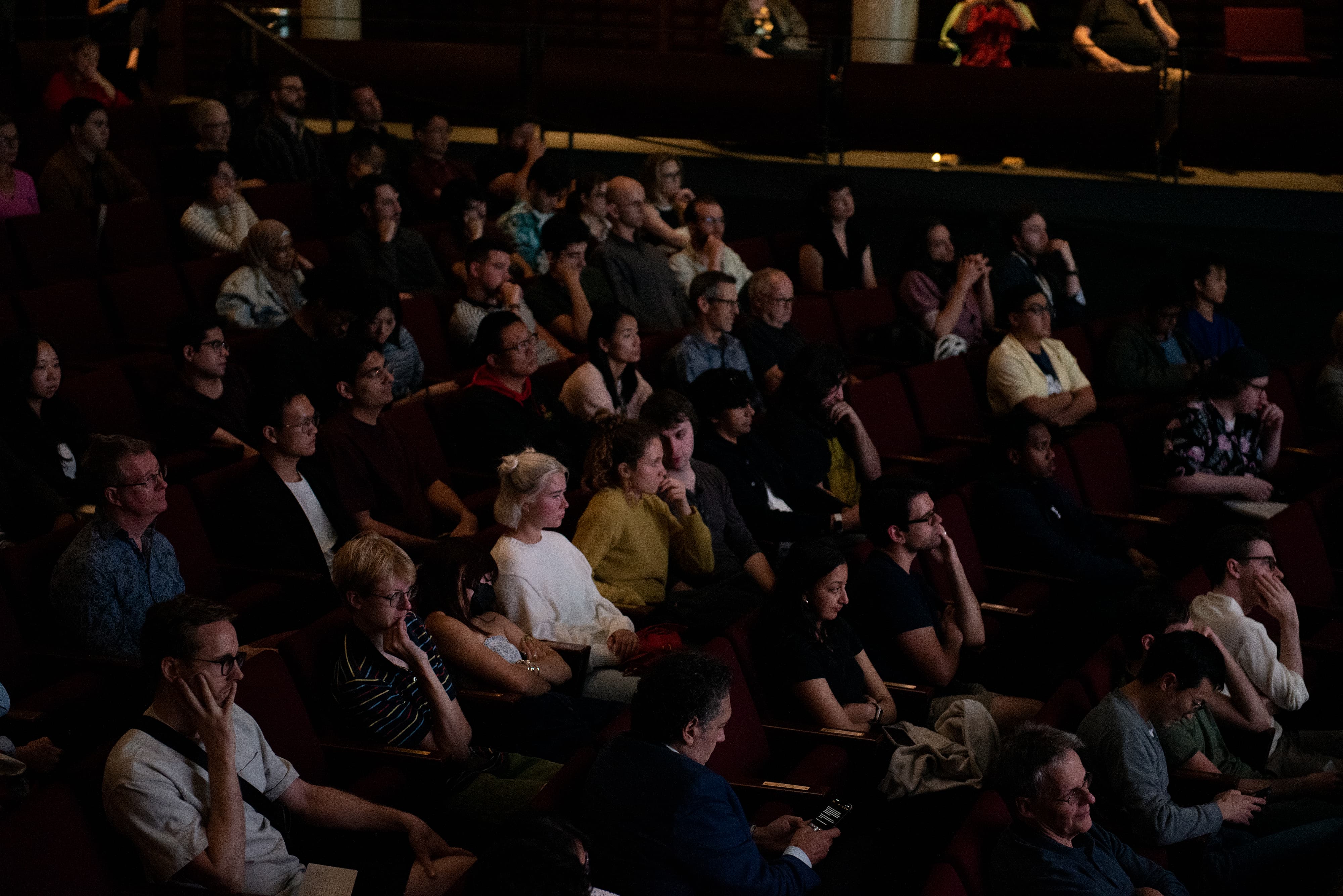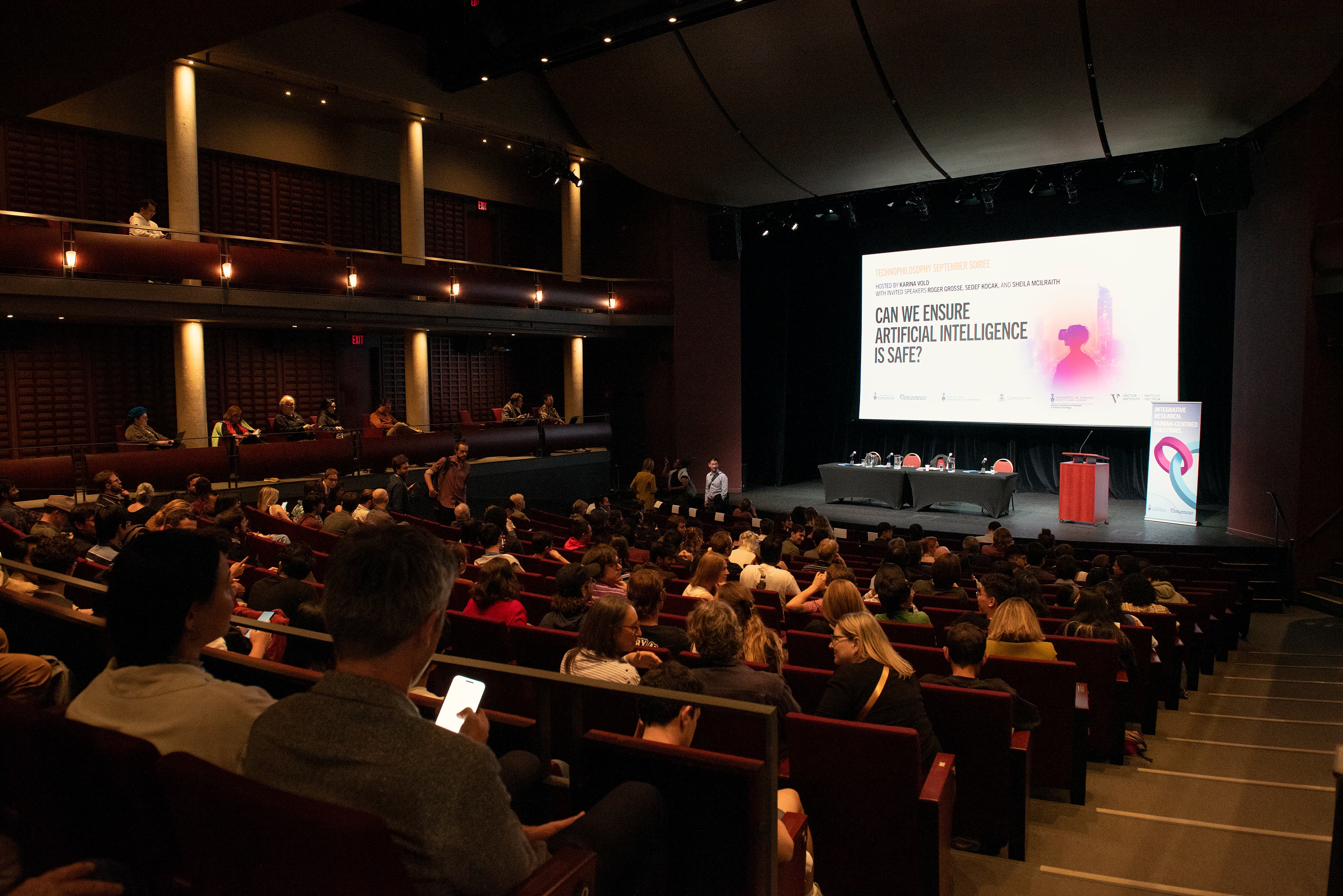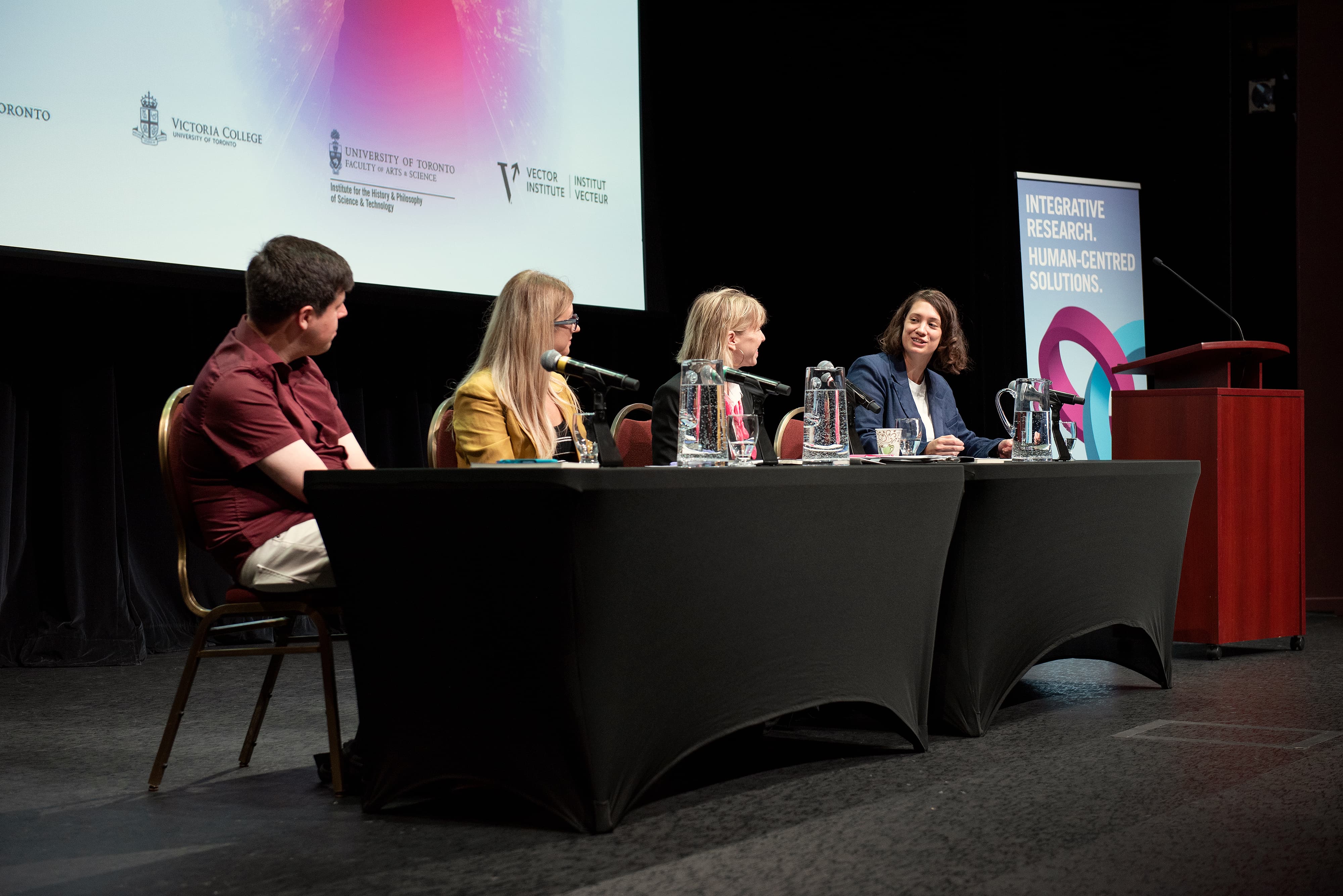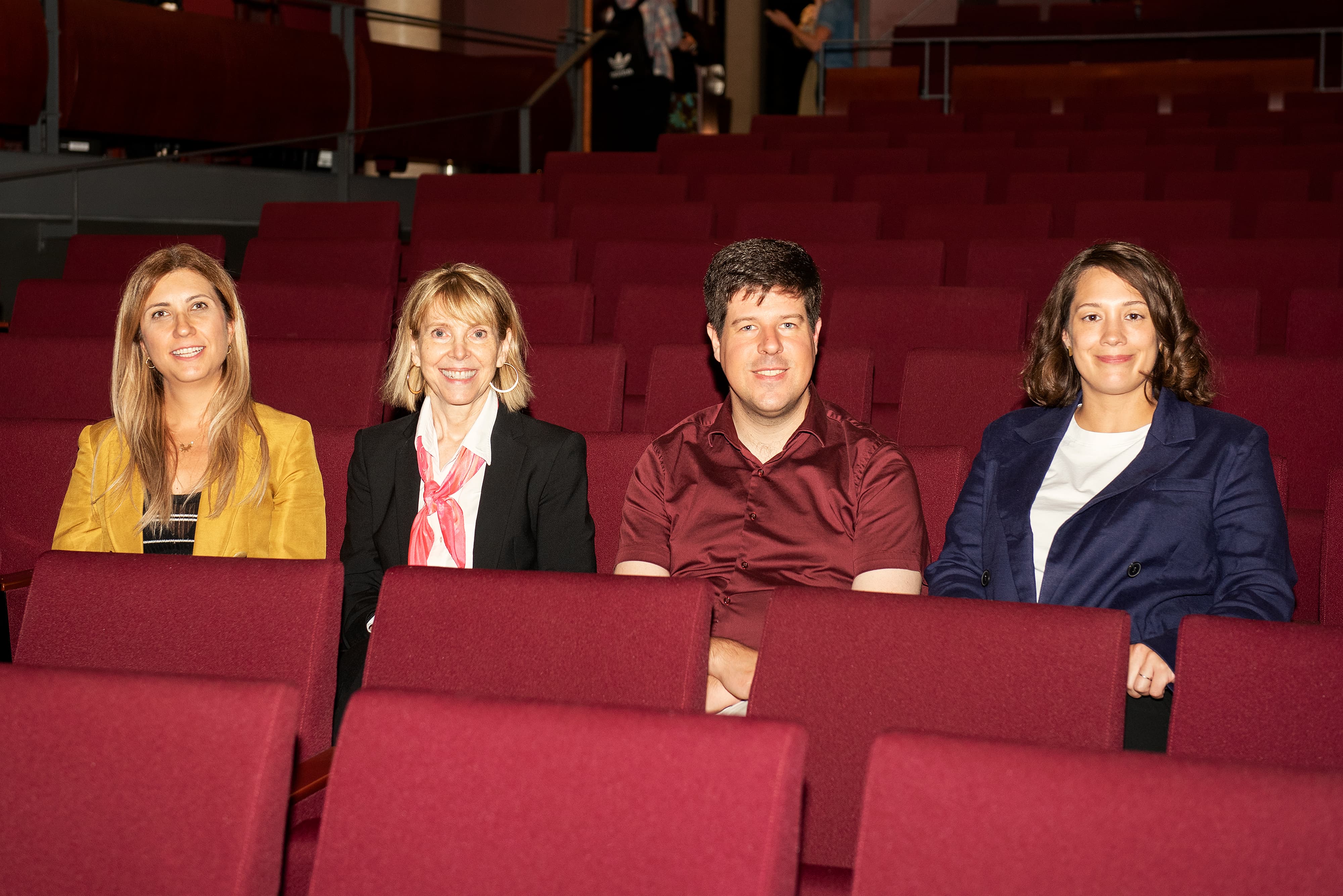Last September, the Isabel Bader Theatre hosted a panel to discuss the crucial question: “Can we ensure AI is safe?” The event attracted a large audience eager to listen and participate in a conversation that explored the multifaceted challenges of AI safety. Organized and moderated by IHPST Assistant Professor Karina Vold, the event brought together a diverse group of experts. Among them were Roger Grosse, the Schwartz Reisman Chair in Technology and Society and Associate Professor in the Department of Computer Science at the University of Toronto; Sedef Kocak, Director of Professional Development at the Vector Institute; and Sheila McIlraith, Associate Director at the Schwartz Reisman Institute for Technology and Society and Professor of Computer Science at the University of Toronto. Throughout the event, the panelists highlighted the urgent need for ongoing dialogue and collaboration to ensure the safe and ethical development of AI.


Prof. Vold opened with the critical question: what does AI safety mean? Prof. McIlraith defined it as “the theory and practice of deploying AI systems that will not harm humanity, but for me personally, I think we should be building AI systems for human flourishing, and to that end we want to aspire in the long term to really building systems that will allow human beings to live with dignity.” This point was reinforced by the other panelists, who agreed that AI should prioritize people’s dignity and societal contributions rather than serve purely functional or commercial interests. Prof. Kocak added that although AI safety may hold different meanings across industries, one of the biggest challenges is creating systems aligned with diverse human values, including democratic principles and the rule of law; while Prof. Grosse highlighted that achieving this vision requires navigating complex technical challenges and addressing them urgently: “in five years from now, at the rate that things are progressing, we could actually have very powerful systems that could be hard to control,” he cautioned.
A key part of the conversation addressed how media and popular culture shape public perceptions of AI, often leaning towards sensationalized or dystopian narratives. “Communications with the public, policies, and the media should balance excitement and engagement without fear,” remarked Prof. Kocak, urging a more measured approach to public discourse around AI. This discussion explored the dual role of media in fostering both informed debate and sometimes unrealistic expectations about AI’s capabilities. When asked about AI’s portrayal in popular culture, Prof. Kocak pointed out that while fictional narratives often highlight dystopian themes, these portrayals influence public perception and sometimes overemphasize existential threat, thus balancing excitement with information is crucial to fostering public understanding of AI. The panel agreed that while speculative fiction can prompt valuable ethical questions, real-world discussions about AI safety should be grounded in empirical data and technical insights rather than fear.

The discussion then addressed the ethical and environmental impacts of AI, particularly in fields like law enforcement and healthcare where biased or misaligned systems could have significant repercussions. Prof. Kocak underscored the importance of cross-sector collaboration to mitigate these issues, saying, “Each time you do use those kinds of big models, you need to think about the environmental implications right now... The bias of the systems is another issue, especially when they are used in critical systems like law enforcement and surveillance purposes.” Summing up the urgency of the issue, Prof. Vold reminded attendees that what was once thought of as “long-term” in AI development has quickly become a pressing, immediate concern. “What we thought would be capable for twenty years, five years ago, is happening now. So, what we think is long-term is not long-term... five years is pretty short,” highlighting the need for adaptable frameworks to manage AI’s ethical and societal impact.
One topic that generated extensive discussion was the double-edged potential of AI-generated content. Prof. McIlraith noted that AI’s capacity to produce vast amounts of text, images, and scientific data brings enormous opportunities but also serious risks. She warned, “AI can produce amazing content…but we’ll also be able to produce a lot of junk and misinformation.” This capability means that AI could both aid scientific discoveries and amplify the spread of misinformation, posing risks not only to users but to the data on which future AI systems will be trained. AI systems are also evolving at a breakneck pace, making it increasingly difficult for policymakers to keep up with regulatory frameworks. Prof. Grosse spoke on this point, explaining that policymakers face a fundamental challenge in proving the safety of AI models, especially when systems evolve unpredictably: “what makes AI safety policy really hard is that we just don’t understand technically how to demonstrate the safety these models will have in the next few years,” he noted, expressing concerns about the potentially severe consequences if AI models go unregulated.
Despite the challenges, the panelists expressed optimism about humanity’s ability to address AI-related risks. Prof. McIlraith highlighted the importance of resilience and innovation, predicting that the future will see “great market incentives for companies that are fact-checkers.” Prof. Kocak added that the development of fact-checking systems and verification mechanisms could offer practical solutions to combat misinformation, deep fakes, and other malicious uses of AI. The conversation also touched on AI’s positive impact across various fields, especially healthcare, where AI-driven discoveries in protein folding could revolutionize the medical field, since most crucial life-sustaining biological activities are performed by proteins. Prof. McIlraith explained that AI can help “predict protein shapes, which is so consequential for medicine,” illustrating AI’s potential for life-saving innovations.
In education, AI also offers opportunities for tailored learning experiences. Prof. Kocak shared that the Ottawa Catholic School Board recently released guidelines to help teachers leverage AI for tailored instruction, especially for students with special needs. She emphasized that AI could be a valuable tool in creating more inclusive and effective learning environments, enabling teachers to provide support that meets the individual needs of each student.

Addressing the ethical considerations surrounding AI, the panel discussed the challenge of aligning AI with human values, particularly in diverse, multicultural societies. Prof. Vold raised the “King Midas problem,” where poorly defined goals can lead to unintended consequences, comparing it to the ancient myth of King Midas, who turned everything he touched to gold. AI, she warned, must be programmed with clearly articulated goals to avoid unintended harmful outcomes.
The event concluded with a call for a multidisciplinary approach to AI safety, involving not only researchers and policymakers but also philosophers, ethicists, and educators. Panelists cited recent international efforts, such as AI safety summits in the UK and South Korea, as positive steps toward global regulatory frameworks.
The discussion underscored the urgency of developing safeguards to prevent the misuse of AI while maximizing its benefits for society. Summing up, Prof. McIlraith observed, “We as a society really need to think about how we want the world to be, how we want to integrate these capabilities into our society.” In a world where AI capabilities are advancing faster than expected, the panel stressed that ensuring ethical, safe, and inclusive AI development must remain a top priority. This event served as a reminder that while AI presents transformative possibilities, it also demands careful, coordinated efforts to ensure it serves humanity’s best interests.
The Technophilosophy September Soiree recording is available on the Schwartz Reisman Institute YouTube channel.
Event hosted by SRI in partnership with the Vector Institute, the IHPST, the Centre for Ethics, and Victoria College.


